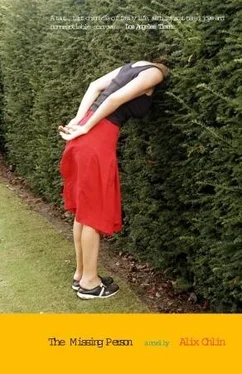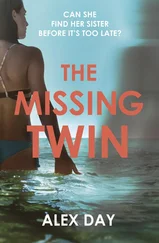The sight of her took me aback, and I realized how much I’d been counting on talking to her, asking her about my father and her work and life, on getting all the answers I’d thought she could provide. I walked down the hallway, bought a Coke from a machine, and pressed the cool can against my face. A nurse came by and smiled at me sympathetically.
“Eva Kent,” I said. “What’s wrong with her, exactly?”
She shrugged and bought a Dr Pepper. “Brain chemistry, I guess.”
I stood there for a minute or two, not sure what to do next.
Then Lincoln came down the hall, smiling at me. “Hey, did you find your great-aunt?”
“Not exactly,” I said.
He put his hand on my arm, again. “She didn’t—”
“Oh, no,” I said. “It turns out I have the wrong place, is all. I messed up. It’s not the first time.”
He bought a can of iced tea. “Don’t be so hard on yourself,” he said sweetly.
“How was your visit?” I asked him.
“Well, with my mother,” he said, “it’s hard to tell.” As he sipped his tea, he raised one leg and placed his right foot against his left knee in a yoga pose, looking completely relaxed.
I gazed intently at his delicate features and dark hair. I still couldn’t figure out how to ask him what I wanted to know. “Is your father in here too?” I said.
“Oh, no,” he said, with a pleasant, musical laugh. “Just my mother. I’m reading Buddhist texts to her right now. I don’t know if she finds it uplifting, but I do.”
“Has she been here long?”
“For as long as I can remember,” he said. “My godfather, Harold — well, unofficial godfather — he put her in here when I was just a kid. I used to hate visiting her, but now I find it kind of restful. I try to think of it as a means of contemplation.” He was sounding like he had in yoga class, his voice low and rhythmic, almost a chant.
“What about the rest of your family?” I said. “Do they come too?”
“I don’t have much family.” Lincoln put his leg down and hoisted up the other, and at the same time — with the can of tea in his right hand — twisted his arms up above his neck. “My mother didn’t have many relatives, and my dad died when I was twelve.”
“He did?” I said. “Are you sure?”
He raised an eyebrow at the question, then laughed. “Yeah, I’m sure. He was this crazy hippie who lived up in Madrid, and in his last will and testament he left me and my mom a lucky horseshoe and his VW minibus. It didn’t even run.”
I stared into his tranquil eyes. A crazy hippie with a lucky horseshoe: this was the last thing I’d expected him to say. I felt an intense, burning anger toward Harold, for leading me astray; it seemed like his fault I was here. I wondered why on earth he’d lied to me — and then it occurred to me that he might not have known about the crazy hippie. I remembered Eva’s note from California, after she’d run away: Dear Harold, I know you will take care of things. Maybe she’d known that Harold would take better care of her son if he thought there was no one else to do it.
“Hold this for a second, will you?” Lincoln asked. I took his drink, and he did a backward bend and then a forward one, sweeping his head down between his outstretched legs. When he came up again his face was red.
I wanted to contradict his story about the hippie father; but on what evidence, and for what reason? Beyond the paintings themselves, I had no reason to think that my father and Eva had even known each other, much less that he’d played any part in her illness. Anything can make a person go crazy: grief, anger, brain chemistry, life.
As I looked at the yoga instructor, the lines I’d drawn— from Eva to her paintings to my father to me — turned to vapor and disappeared. Eva had probably never met my father, and hadn’t gone crazy because of their affair. Nor had Daphne Michaelson been trying to tell me anything at all, except that she distinctly preferred certain shades of red lipstick over others. I’d invented all of it. I’d started out wanting to construct a story about the paintings for Michael, and wound up tailoring it to myself. “Sometimes I think I’m the one who’s crazy,” I said out loud.
“Honey, everybody’s crazy,” Lincoln said. “The only sane person I know is my cat. Good luck with your great-aunt, okay?” Then he took back his drink and walked away down the hall.
Outside the sun still shone, heavy, inescapable, and my eyes started to water in the parking lot and wouldn’t stop. The Caprice fired up with a knocking sound, and the engine gave a low moan when I pulled out. For the second time this summer I went to my father’s grave, which was every bit as inadequate as I remembered it: the sickly, brown-tinged grass, edging into dirt at the sides of the cemetery; the shiny red granite of new-fashioned tombstones, some with photographs airbrushed on them, the dead smiling and youthful, never anticipating to what purpose the pictures would be put. Or maybe they were smiling because they knew that their grip on the living would never be released; they’d maintain their mystery forever; they’d never have to answer any questions. As I was thinking this, a flock of crows landed a few graves in front of me and began to pick and tear at the grass, their ragged black feathers shiny in the light.
In the mid-distance rose the Sandias, their reddish-brown peaks outlined crisp and wild as in a painting by Eva Kent. She and Daphne could have quite a party together, I thought. My mother was the only sane woman I knew, and her sanity was so conspicuously neat and controlled that I was starting to wonder about her, too. This summer was crowded with crazy women and caretaking men, with parents who made their children uneasy, with condos and apartments and institutions, with homes that were not what they’d once been. And everywhere there were fathers, or awkward yet unavoidable substitutes: David Michaelson; Harold Wallace; even Wylie doting fatherlike on Psyche. The days were full of fathers, and none of them was mine. Grief roiled across the world, forever rippling its surface; that, I thought, was the permanent wave. When a feeling’s that tenacious, what can you do but say hello to it and keep going? I turned away to find my mother and tell her, as best I could, that I was sorry.
The Caprice shuddered whenever I went above sixty-five, its chassis shaking like a child with a high fever: a new and disturbing symptom. In the rearview mirror I could see a thin band of black air moving across the sky, and when I rolled down the window, the ashy smell of a fire wafted faintly through the car. This whole state was as dry as kindling, ready to light. I could barely remember the last time I’d seen rain.
The curtains were drawn at my mother’s house and I saw shapes moving behind them — my mother and David, no doubt, waiting for me to come home, make my apologies, and face my punishment. Maybe I could spend a week at his house, doing chores as a means of reparation, like the child I truly was. But as I opened the front door, from the kitchen came the sweet sounds of Frank Sinatra, tinkling glasses, and loud, low, horsey laughter. Wylie, Angus, and Irina, with Psyche in her sling, were all making themselves drinks, and the entire contents of my mother’s well-provisioned refrigerator were emptied onto the counter. Sandwiches were in the making; fruit was being peeled and eaten. As a group they smelled delightful, soapy and fresh, their cheeks red and shiny from recent showers.
Angus was leaning against the far counter, using his finger to stir a glass of what I knew must be gin. His clothes were as tattered as ever, his skin as freckled, his hair as red. “Knew you couldn’t stay away from us,” he said.
Читать дальше












